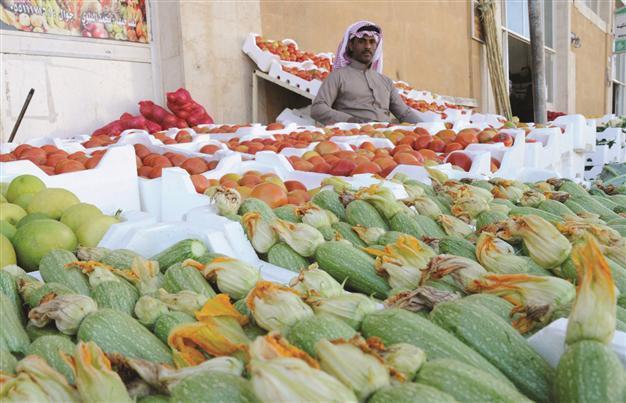Gulf states seek securing food supply in Europe, US
ABU DHABI - Reuters

A Saudi vendor rests as he sells vegetables at a shop in Tabuk. Projects in Europe and North America tend to be more expensive for Gulf states and offer less scope to build vast estates like in Africa. REUTERS photo
The desert states of the Gulf are changing tack in their multi-billion dollar search for food security.
With their farming projects in some of the poorest African nations sometimes arousing local hostility, wealthy Arab investors are turning to those developed countries that comfortably produce more food than they consume.
United Arab Emirates-based agricultural firm Al Dahra has chosen this path in March, buying eight agricultural companies for $400 million in Serbia, a major food exporter where public attitudes to foreign-owned farming may be less sensitive.
Projects in Europe, North America and Australasia tend to be more expensive and offer less scope to build vast estates like in Africa. But they also present fewer political problems and less risk for the UAE, Saudi Arabia, Qatarand Kuwait which all need to feed growing populations.
For years the Gulf states, dependent on imports for 80 to 90 percent of their food, poured cash into buying tens of thousands of hectares of cheap farmland and other agricultural assets in the developing world, mainly Africa.
At the same time, expensive programs to increase food production within the Gulf were running up against the region’s brutal climate and lack of water.
So Gulf states encouraged their companies to buy arable land in the developing world.
Setting sail for safer destinations
The last few years have demonstrated the limits of the Gulf’s strategy of throwing money at the food security problem, however. Many projects abroad have found themselves vulnerable to capricious policy changes and trends in local politics.
Gulf states are therefore looking more closely at projects in Europe and the United States, where political and policy risks - while not negligible - seem smaller.
Details of some projects are not announced, so there is no comprehensive information on the scope of the Gulf investment. But Bailey said Gulf states were “rebalancing their portfolios” towards the West in the agricultural sector.
Al Dahra’s investment in Serbia, aimed at developing the companies to grow and process food for export, was said to be the biggest investment in the country’s agriculture for decades. In addition the Abu Dhabi Fund for Development, an official aid body, announced a $400 million loan to Serbia’s agriculture sector.
Gulf projects in Africa were often mainly land purchases, needing infusions of technology for farming to begin. By contrast, many of the investments in Europe are in agricultural businesses that just need some financial help to grow.
Gulf executives and officials insist they will not give up on most of their ventures in the developing world.
